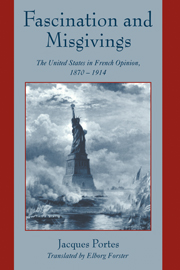Book contents
- Frontmatter
- Contents
- Preface
- Introduction
- Part I The United States as Exoticism
- Part II Models from the United States
- 6 A Truly American Democracy
- 7 A Political Life without Grandeur
- 8 The New World of Education
- 9 La Belle Américaine
- 10 From the Mormons to Americanism
- 11 Social Hell or Social Harmony?
- Part III The United States as Power
- Conclusion
- Selective Bibliography
- Index
8 - The New World of Education
Published online by Cambridge University Press: 07 October 2009
- Frontmatter
- Contents
- Preface
- Introduction
- Part I The United States as Exoticism
- Part II Models from the United States
- 6 A Truly American Democracy
- 7 A Political Life without Grandeur
- 8 The New World of Education
- 9 La Belle Américaine
- 10 From the Mormons to Americanism
- 11 Social Hell or Social Harmony?
- Part III The United States as Power
- Conclusion
- Selective Bibliography
- Index
Summary
If many of the French saw the American political model as a shining example in the early nineteenth century and a little beyond, it may have been because the United States had the decisive advantage of being a democracy functioning at its best at a time when France seemed happily determined to evade any form of institutional stability. What seemed surprising was that a new country, whose remnants of savagery were often underlined by French observers, should be able to set the example of a successful school system. And surprise is precisely what French observers, many of whom were very thorough, regularly experienced as they examined various aspects of American education.
Their comments followed the development of the educational system of the United States, from preschool to the university, as it came into being, but they also studied it in relation to the educational upheaval France was undergoing at this time. The American elementary school, which had existed for a long time, actually changed with the introduction of public education in the South and with the need to include large numbers of immigrants; at almost the same time the Third Republic implemented the Ferry Laws which gave it the system of elementary education that was to serve it so well. Similarly, the American universities and colleges entered their phase of greatest growth and influence at the end of the nineteenth century, at the time when France achieved a powerful renewal of its higher education.
The dominant impression of the French observers was highly favorable, and they sought to find out what made it so and whether this example could be applied to the French experience.
- Type
- Chapter
- Information
- Fascination and MisgivingsThe United States in French Opinion, 1870–1914, pp. 228 - 253Publisher: Cambridge University PressPrint publication year: 2000

